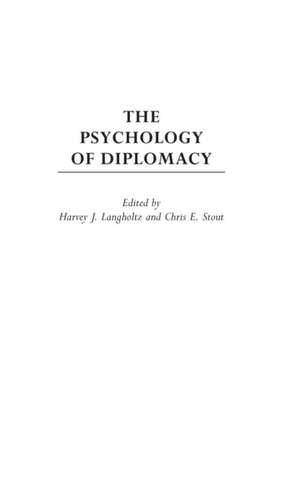The Psychology of Diplomacy: Psychological Dimensions to War and Peace
Autor Harvey Langholtzen Limba Engleză Hardback – 29 apr 2004 – vârsta până la 17 ani
Preț: 414.56 lei
Preț vechi: 632.96 lei
-35% Nou
Puncte Express: 622
Preț estimativ în valută:
79.36€ • 82.49$ • 65.80£
79.36€ • 82.49$ • 65.80£
Carte tipărită la comandă
Livrare economică 08-22 februarie 25
Preluare comenzi: 021 569.72.76
Specificații
ISBN-13: 9780275971441
ISBN-10: 0275971449
Pagini: 288
Dimensiuni: 156 x 235 x 26 mm
Greutate: 0.57 kg
Ediția:New.
Editura: Bloomsbury Publishing
Colecția Praeger
Seria Psychological Dimensions to War and Peace
Locul publicării:New York, United States
ISBN-10: 0275971449
Pagini: 288
Dimensiuni: 156 x 235 x 26 mm
Greutate: 0.57 kg
Ediția:New.
Editura: Bloomsbury Publishing
Colecția Praeger
Seria Psychological Dimensions to War and Peace
Locul publicării:New York, United States
Notă biografică
HARVEY J. LANGHOLTZ is Associate Professor of Psychology at the College of William and Mary. He is a Special Senior Fellow of the United Nations Institute for Training and Research. He is also Series Editor for the Praeger series, Psychological Dimensions to War and Peace, and the Editor of Kluwer Law International's International Peacekeeping Yearbook. From 1991 to 1993 he was a U.S. Delegate to the United Nations, including service with the Special Committee on Peacekeeping Operations.CHRIS E. STOUT is Adjunct Associate Professor of Psychology at the Northwestern University Medical School, and a Visiting Clinical Professor at the University of Illinois College of Medicine. He serves as Illinois' first Chief of Psychological Services. He served as an NGO Special Representative to the United Nations, was appointed by the U.S. Department of Commerce as a Baldridge Examiner, and has served as an advisor to the White House for both political parties.
Cuprins
The Psychology of DiplomacyA Psychologist in the Diplomat's Court: A Primer by Chris E. StoutReconciliation Between Nations: Overcoming Emotional Deterrents to Ending Conflicts Between Groups by Arie Nadler and Tamar SaguyThe Psychology of Diplomatic Conflict Resolution by Stuart SeldowitzDiplomacy in an Era of Intrastate Conflict: Challenges of Transforming Cultures of Violence Into Cultures of Peace by Michael WessellsMulti-Track Diplomacy: Global Peace Initiatives by Tyrone F. Price and Linda A. PriceThe Psychology of Diplomacy, as Manifested in the Role of Sub-regional and Regional Organizations in Preventing African Conflicts by Betsie SmithThe Psychology of Middle Eastern Water Conflicts by Matthew F. Shaw and Jeff DanielskiApplied Anthropology and Diplomacy: Renegotiating Conflicts in the Eurasian Diplomatic Gray Zone by Using Cultural Symbols by Ignacy Marek KaminskiThe Making of a Non-Violent Revolution: The 1985-1994 South African Banking Sanctions Campaign by Terry Crawford-BrowneFiction Versus Function: The Persistence of "Representative Character" Theory in the Law of Diplomatic Immunity by Jeffrey K. Walker














